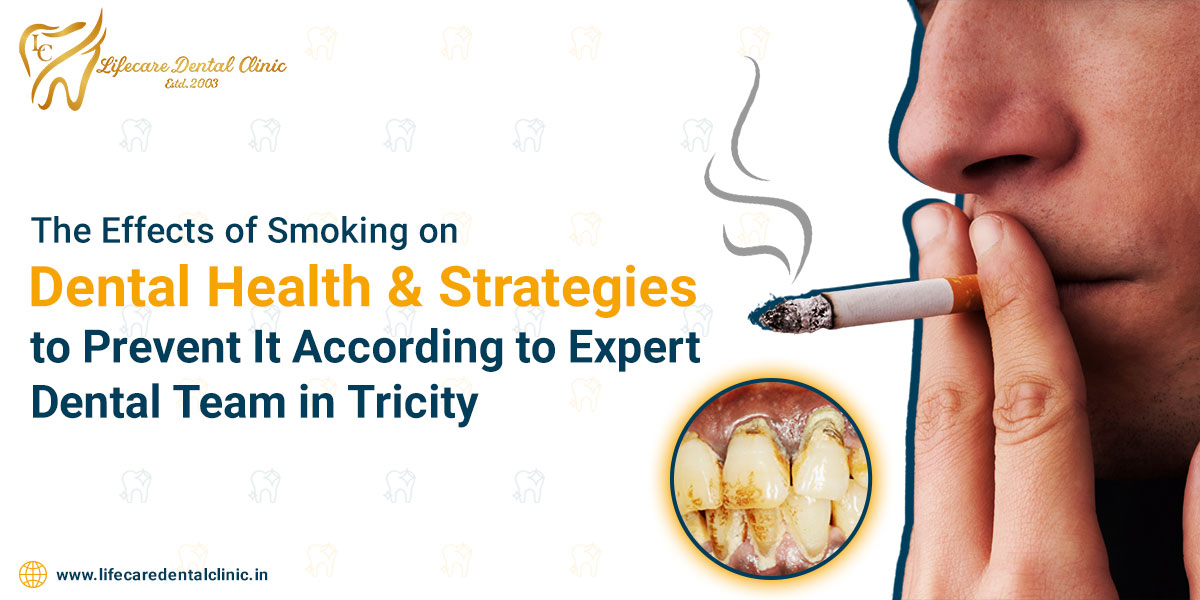The Effects of Smoking on Dental Health and Strategies to Prevent It According to Expert Dental Team in Tricity

Published Date: April 19, 2024 Last Update: September 27, 2024
Author: Dr. Kirandeep Kaur
Smoking is not only harmful for your lungs and heart but it also wreaks havoc on your dental health, leading to a range of oral health issues. From staining teeth to increasing the risk of gum disease and oral cancers, the effects of smoking on dental health are profound and multifaceted. In this blog post, we will explore how smoking adversely affects your oral hygiene and overall dental well-being.
Read This Article - Clear Aligners vs Traditional Braces – What’s Better For You?
How Smoking Effects Your Dental Health According to Expert Dental Team in Tricity
1. Discoloration and Staining of Teeth:
One of the most noticeable effects of smoking is the staining and discoloration of teeth. Nicotine and tar, present in cigarettes, can quickly turn white teeth into shades of yellow and brown and this concern often leads smokers to feel self-conscious about their smiles.
2. Increased Risk of Gum Disease:
Smokers are substantially more likely to develop gum disease compared to non-smokers. Smoking affects the attachment of bone and soft tissue to your teeth. It interferes with the normal function of gum tissue cells and makes smokers more susceptible to infections like periodontal disease.
3. Higher Risk of Oral Cancers:
Long-term smoking can lead to serious health conditions including oral cancer. Smokers are at a six times greater risk of developing cancers of the mouth, upper throat, gums, and inner cheeks.
4. Delayed Healing After Dental Procedures:
Dental procedures such as tooth extractions, periodontal treatment, or oral surgery require a healthy blood flow for quick healing. Smoking can restrict blood vessels and limit blood flow, which can delay the healing process following dental procedures significantly. That’s why dentists suggest to not smoke after tooth extraction and dental filling.
5. Bad Breath:
Cigarette smoke lingers in your mouth long after you’ve finished smoking. This not only causes bad breath but also affects taste perception. Chronically bad breath from smoking is an immediate turn-off for many people and can negatively impact social interactions.
Read This Article - Common Causes of Bad Breath and How to Treat It
Strategies to Prevent Teeth and Gum Problems for Smokers According to Expert Dental Team in Tricity
1. Prioritize Oral Hygiene:
Good oral hygiene is essential for everyone but paramount for smokers. Brushing twice a day, flossing daily, and using an antiseptic mouthwash can significantly mitigate the negative effects of smoking on oral health.
2. Regular Dental Check-ups:
Smokers should not skip their dental appointments. The dentists at Life Care Dental Clinic in Tricity can spot early signs of gum disease, oral cancers, and other related conditions that are common among smokers. Frequent dental check-ups not only help in early detection but also help in managing smoking-related dental problems. You can book your appointment now to get quality dental care services in Chandigarh.
3. Quit Smoking:
The most effective way to protect your dental health and prevent teeth and gum problems is to quit smoking altogether. Seek support groups, therapy or consider nicotine replacement therapies or consult with a healthcare professional for guidance tailored to you. This dramatically lowers the risk for most smoking-related diseases, including those affecting oral health.
4. Eat a Healthy Diet:
Eating a healthy diet that’s rich in vitamins and minerals supports your body in maintaining strong teeth and healthy gums. Some of the best foods for smokers include leafy greens, apples, cottage cheese, carrots, celery, and almonds.
5. Stay Hydrated:
Dry mouth increases the risk of dental health issues. That’s why it is important to drink enough water to keep your mouth moist which is vital in cleansing away bacteria.
6. Chew Sugar-free Gum:
Chewing sugar-free gums protects teeth from decay and stimulates saliva production which naturally fights off bacteria in the mouth.
Conclusion:
Smoking has far-reaching effects on your dental health that extend beyond mere aesthetics. While smokers face a higher risk for dental problems, taking proactive steps such as maintaining oral hygiene, seeing a dentist regularly or taking general dentistry services in Tricity, considering smoking cessation programs, eating a balanced diet, staying hydrated, and using sugar-free gum are all practical ways to defend against tooth decay and gum disease. Remember that it’s not just about preserving your smile, it’s about safeguarding your overall health.
Read this article:- 7 Facts About Laser Teeth Whitening Treatment that You Should Know

Leave A Reply